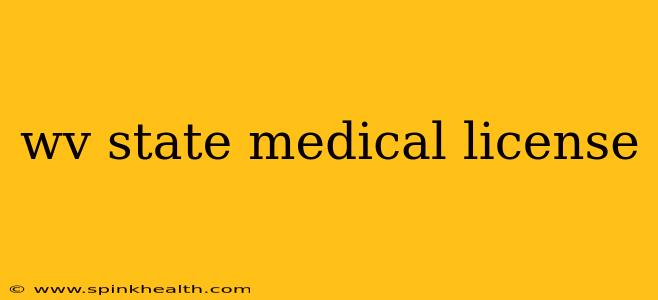Navigating the West Virginia State Medical License Maze: A Doctor's Journey
The journey to obtaining a West Virginia state medical license can feel like navigating a complex maze, filled with twists, turns, and unexpected hurdles. But fear not, aspiring and practicing physicians! This guide will illuminate the path, answering your burning questions and offering insights into this crucial process. We'll explore the requirements, the application process, and even some common pitfalls to avoid.
My name is Dr. Evelyn Reed, and for over 15 years, I've helped countless doctors navigate the licensing process in various states, including West Virginia. I understand the anxieties and complexities involved, and I'm here to demystify this critical step in your medical career.
What are the requirements for a West Virginia medical license?
This is often the first question on every doctor's mind. West Virginia, like most states, has a rigorous process designed to ensure patient safety and uphold high standards of medical practice. The requirements generally include:
- Medical Degree from an Accredited Institution: You'll need a medical degree from a medical school accredited by the Liaison Committee on Medical Education (LCME) or a comparable accrediting body.
- Successful Completion of USMLE or COMLEX: The United States Medical Licensing Examination (USMLE) or the Comprehensive Osteopathic Medical Licensing Examination (COMLEX) are crucial for demonstrating competency. Specific passing scores are required.
- Residency or Fellowship: A completed residency or fellowship in your chosen specialty is generally necessary. The specifics depend on your specialty and practice area.
- Background Check and Fingerprinting: West Virginia requires a comprehensive background check and fingerprinting as part of the application process, ensuring the safety and well-being of its citizens.
- Malpractice Insurance: You must maintain adequate professional liability insurance to protect yourself and your patients.
- Successful Completion of the Application: This involves filling out numerous forms accurately and completely, providing all the required documentation, and paying the associated fees.
It's crucial to check the West Virginia Board of Medicine's website for the most up-to-date and precise requirements, as regulations can change.
What documents do I need to apply for a WV medical license?
This is where the "maze" feeling often intensifies. The required documents can seem overwhelming, but careful organization is key. Typically, you'll need:
- Completed Application Form: Download and meticulously fill out the application form available on the West Virginia Board of Medicine's website.
- Medical School Transcripts: Official transcripts from your medical school, verifying your degree and coursework.
- USMLE or COMLEX Scores: Official score reports from the USMLE or COMLEX.
- Residency or Fellowship Completion Certificates: Documentation confirming the successful completion of your training program.
- Background Check and Fingerprinting Results: These must be completed through a Board-approved vendor.
- Proof of Malpractice Insurance: Evidence of sufficient professional liability insurance coverage.
- Passport Photos: Follow the guidelines provided by the Board for acceptable passport-style photographs.
How long does it take to get a West Virginia medical license?
The processing time varies depending on several factors, including the completeness of your application and any potential delays in verification of documents. It’s best to start the process well in advance of your desired start date. Expect the process to take several months.
What are the fees associated with obtaining a WV medical license?
The fees for the medical license application and associated processes are clearly outlined on the West Virginia Board of Medicine’s website. These fees are subject to change, so it's important to check the latest information directly from the source.
Can I practice medicine in West Virginia with a temporary license?
Yes, West Virginia offers temporary licenses in certain circumstances. These are usually granted while the full licensing process is underway and are often subject to specific conditions and limitations. Contact the Board of Medicine directly to explore temporary licensing options.
What happens if my application is denied?
Application denial can be disheartening, but understanding the reasons is crucial. The Board typically provides clear explanations for denials, helping applicants understand areas needing improvement for reapplication.
Remember, the West Virginia Board of Medicine’s website is your primary resource. Check it frequently for updates and the most accurate information. This comprehensive guide aims to provide a clear understanding, but always rely on official sources for definitive answers. Good luck on your journey!

